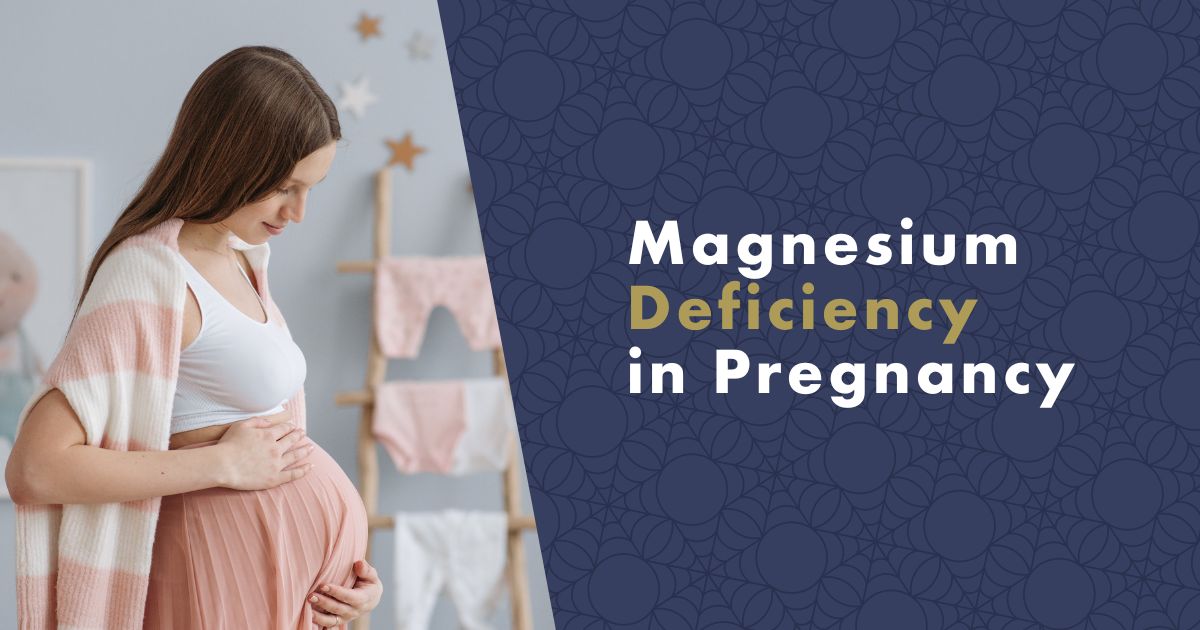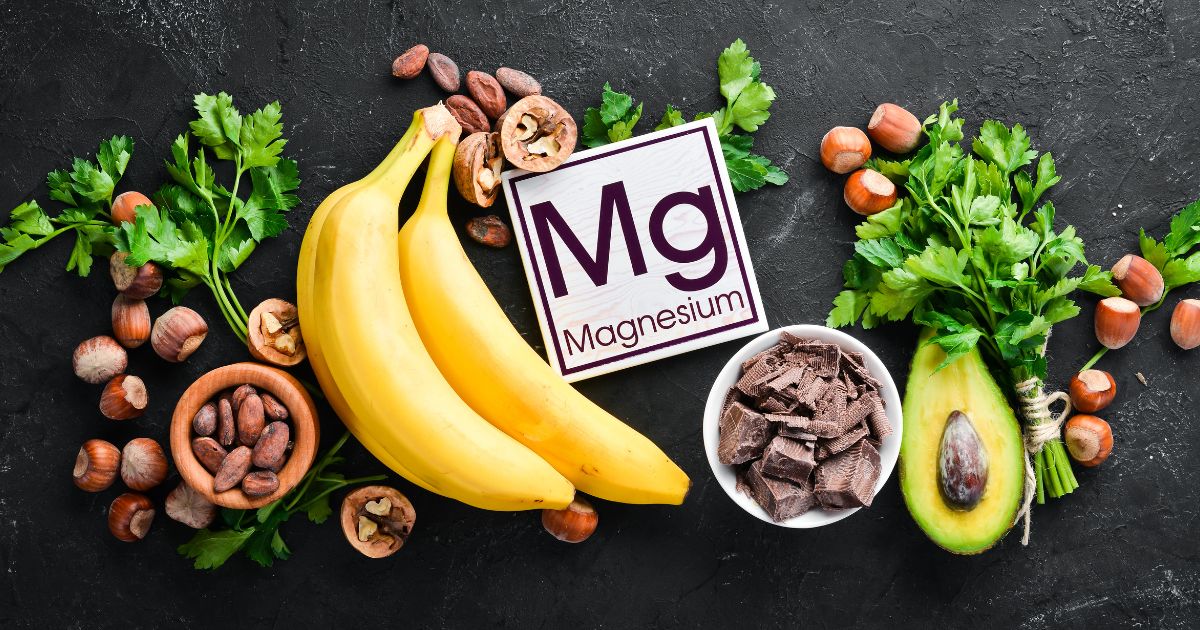We all know how important magnesium is for the human body, regulating the cardiovascular system, combating stress, and helping stabilize blood pressure. So it's no surprise that magnesium in pregnancy plays an indispensable role in the health of both mother and fetus. During pregnancy, you also excrete much more magnesium, which is why increasing its intake is important. Let's take a look at why taking magnesium during pregnancy is important and, most importantly, how to properly supplement it.

Why is Magnesium Important During Pregnancy
Magnesium is a mineral that plays a key role in the body's function, especially when a woman is pregnant. Magnesium is involved in muscle function, increases resistance to stress, and helps alleviate menstrual symptoms in women. During pregnancy, it plays an important role in controlling contractions and muscle relaxation. Magnesium intake during pregnancy is also important for the proper functioning of the placenta. In addition, magnesium deficiency in the body can affect the proper growth and development of the fetus.
Your body needs magnesium more than ever during pregnancy, and if you cannot obtain it through diet, you can choose appropriate dietary supplements.

Tip: What helps with lower abdominal pain?
The Impact of Magnesium on the Health of Pregnant Women and Their Babies
The level of magnesium plays an important role for both the woman and the fetus. Pregnant women may experience calf cramps, stress, exhaustion, and poor sleep. In cases of severe magnesium deficiency, pregnant women may experience premature contractions or even premature labor.
Preventing Cramps
Magnesium helps maintain proper muscle and nervous system function. Magnesium deficiency can lead to more frequent calf cramps, which can occur during pregnancy. Cramps can also occur in the abdominal area.
Supporting Fetal Development
Aside from proper fetal growth and development, magnesium influences human development throughout life. Magnesium supports bone, tooth, and genetic material formation necessary for normal fetal development.
Why Magnesium Deficiency in Pregnancy is Dangerous
Magnesium deficiency during pregnancy poses a risk for both you and your child. If you notice any of these symptoms, you should consult your gynecologist about appropriate magnesium supplementation during pregnancy. Some possible problems caused by magnesium deficiency include:
- General fatigue, exhaustion.
- Nail breakage and tooth decay.
- Muscle pain and cramps: Magnesium deficiency can lead to muscle pain, calf cramps, and overall weakness.
- Increased stress: Magnesium plays a crucial role in regulating stress hormones, so its deficiency can cause increased stress and anxiety.
- Preeclampsia: Low magnesium levels during pregnancy can increase the risk of preeclampsia, a serious health problem that can endanger both you and your child.
- Increased risk of premature birth and miscarriage.
Causes of Magnesium Deficiency
- Low magnesium intake in food: Many pregnant women simply do not consume magnesium-rich foods.
- Increased demand for magnesium: During pregnancy and breastfeeding, the need for magnesium increases for the health of both the woman and the child.
- Gastrointestinal problems: Diseases and disorders of the digestive system, such as vomiting or diarrhea, can reduce magnesium absorption.

Tip: Magnesium Deficiency – Causes, Symptoms, and How to Replenish It.
Recommended Daily Magnesium Intake During Pregnancy
During pregnancy, it is recommended to consume daily:
- 300-350 mg of magnesium for pregnant women under 18 years old,
- 310-360 mg of magnesium for pregnant women aged 19-30,
- 320-370 mg of magnesium for pregnant women over 30 years old.
How to Recognize Magnesium Deficiency During Pregnancy
You can observe magnesium deficiency during pregnancy from your own sensations, which include:
- Exhaustion,
- Pelvic pain,
- Leg cramps,
- Constipation or high blood pressure.
However, these symptoms do not always indicate magnesium deficiency, so it is advisable to consult a doctor.
Tip: How to Improve Sleep Quality: Sleep Hygiene for Children and Adults.
How to Recognize High Levels of Magnesium During Pregnancy
Although magnesium overdose is not common during pregnancy, higher intake of magnesium may cause diarrhea or excessive sweating.
How Long is Magnesium Supplementation Needed During Pregnancy?
Magnesium also plays an important role during pregnancy and lactation. Therefore, it is important to pay attention to preventive measures and start taking magnesium even when considering pregnancy. Some doctors may recommend discontinuing magnesium supplements around the 36th week of pregnancy. This is because magnesium can reduce the effectiveness of the uterus, which could affect contractions during childbirth. However, many doctors recommend taking magnesium throughout pregnancy and breastfeeding.

Safe Natural Sources of Magnesium During Pregnancy
Magnesium can be obtained from many natural sources that contain higher amounts of this mineral. To ensure an adequate intake of magnesium during pregnancy, you can include foods high in magnesium in your diet, such as legumes, nuts, or seeds.
Tip: What Is the Best Collagen for Skin, Hair, and Joints?
Which Foods Contain Magnesium?
To ensure sufficient magnesium intake during pregnancy, it is recommended to focus on the following sources of magnesium in your diet.
- Green leafy vegetables, such as spinach and kale.
- Cereals, such as buckwheat and oatmeal.
- Whole grains, such as brown rice and whole grain bread.
- Plant-based milk, such as almond and soy milk.
- Nuts and seeds, such as almonds, hazelnuts, and sunflower seeds.
- Legumes, such as lentils, beans, and peas.
- Mineral water with magnesium content.
- Bananas: In addition to magnesium, they also contain potassium, which is important for maintaining electrolyte balance and preventing cramps.
- Dates: Medjool dates not only contain magnesium, but their consumption is associated with smoother childbirth.
- Buckwheat: It is gluten-free and rich in magnesium, making it an ideal part of a healthy pregnancy diet.

Tip: Vegans should take vitamins and dietary supplements.
Magnesium Supplements During Pregnancy
Since magnesium levels can decrease by up to 10% during pregnancy, it is necessary to ensure an adequate intake of magnesium. Supplements can help with higher magnesium intake during pregnancy. However, pregnant women should pay attention to dosage and choose the right type of magnesium.
The most commonly recommended magnesium supplements include:
- Magnesium citrate.
- Magnesium oxide.
- Magnesium chloride.
Tip: Vitamin D Deficiency: How to Supplement It?
The Most Effective and Best Magnesium During Pregnancy
Magnesium citrate is well-absorbed and is often recommended for pregnant women. If you're looking for a natural form of highly absorbable magnesium, choose Magnesium complex with Aquamin Mg derived from the pure waters off the Irish coast. Premium magnesium powder with additional vitamins B1 and B6 is a great choice for pregnant women.
Magnesium supplements should be used with caution and in accordance with your doctor's recommendation. Be aware of any interactions with other medications or supplements you are taking. It is also important to remember that you can obtain magnesium from foods, which should form the basis of your balanced diet during pregnancy.
#produkty#https://www.nanospace.store/sleep-and-stress/?pv277=2500
Prevention of Magnesium Deficiency During Pregnancy and Breastfeeding
The increased need for magnesium continues during breastfeeding, when it increases by 15-20% compared to the pregnancy period. As a nursing mother, you must pay attention to your intake of magnesium not only for your health but also for the proper development of your child. Therefore, it is necessary to consume magnesium-rich foods, avoid excessive stress and fatigue, which can increase the need for magnesium. Lastly, consult your magnesium intake with your doctor.
FAQ - Frequently Asked Questions
How to replenish magnesium during pregnancy?
To replenish magnesium during pregnancy, you can include magnesium-rich foods in your diet. These foods include: nuts and seeds, leafy greens, grains, and chocolate. If recommended by your doctor, you can also take magnesium supplements during pregnancy.
How long to take magnesium during pregnancy?
The duration of magnesium intake during pregnancy may vary depending on the needs of the pregnant woman and the condition of the fetus. It is always important to consult your condition with a doctor.
When to stop taking magnesium during pregnancy?
If your doctor advises that magnesium is no longer needed, you should stop taking it. Until then, it is important to follow your doctor's recommendations.
How does magnesium deficiency manifest during pregnancy?
Some symptoms of magnesium deficiency during pregnancy may include muscle cramps, fatigue, irritability, and sleep disturbances.
What magnesium is suitable for pregnant women?
Magnesium citrate, for example, may be suitable for pregnant women as it is well-absorbed.
When to start taking magnesium during pregnancy?
You can start supplementing magnesium even before conception. You can consult the right time to take magnesium during pregnancy with your obstetrician.
What is the recommended magnesium dosage for a pregnant woman?
300 mg of magnesium per day is an effective and safe dose for a pregnant woman throughout pregnancy.
Is magnesium needed during breastfeeding?
Just as during pregnancy, magnesium intake needs to be ensured during breastfeeding. This is because women pass a significant amount of magnesium to their child through breast milk.
Sources
- Dalton, L. M., Ní Fhloinn, D. M., Gaydadzhieva, G. T., Mazurkiewicz, O. M., Leeson, H., & Wright, C. P. (2016). Magnesium in pregnancy. Nutrition reviews, 74(9), 549-557.
- Makrides, M., Crosby, D. D., Shepherd, E., & Crowther, C. A. (2014). Magnesium supplementation in pregnancy. Cochrane Database of Systematic Reviews, (4).
- Zarean, E., & Tarjan, A. (2017). Effect of magnesium supplement on pregnancy outcomes: a randomized control trial. Advanced biomedical research, 6.
- Kotrbová, D. (2009). Doplňky stravy v graviditě. Praktické lékárenství, 5(1).

